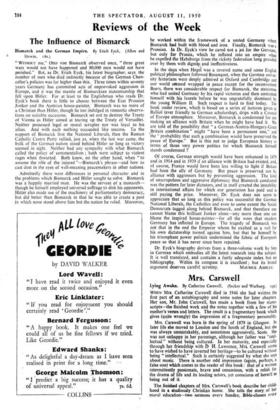Reviews of the Week
The Influence of Bismarck
• Wrrnour me," Otto von Bismarck observed once, " three great wars would not have happened and 80,000 men would not have perished." But, as Dr. Erich Eyck, his latest biographer, says. the number of men who died indirectly because of the German Chan- cellor's policies was far higher than this. Three times within seventy years Germany has committed acts of unprovoked aggression in Europe, and it was the mantle of Bismarckian statesmanship that fell upon Hitler. For at least to the Englishman who reads Dr. Eyck's book there is little to choose between the East Prussian Junker and the Austrian house-painter. Bismarck was no more of a Christian than Hitler, though he too indulged in romantic observa- tions on suitable occasions. Bismarck set out to destroy the Treaty of Vienna as Hitler aimed at tearing up the Treaty of Versailles. Neither possessed legal or moral scruples nor was loyal to his allies. And with each nothing succeeded like success. To the support of Bismarck first the National Liberals, then the Roman Catholic Centre Party rallied, just as, when the last war came, the bulk of the German nation stood behind Hitler so long as victory seemed in sight. Neither had any sympathy with what Bismarck called the policy of sentimentalism ; both were subject to violent rages when thwarted. Both knew, on the other hand, when " to assume the role of the injured "—Bismarck's phrase—and how to cast dust in the eyes of well-meaning peacemakers in other nations.
Admittedly there were differences in personal character and in the problems which Bismarck and Hitler sought to solve. Bismarck was a happily married man. He was the servant of a monarch— though he himself employed universal suffrage to dish his opponents. Hitler also made use of the machinery of parliamentary democracy, but did better than Bismarck in that he was able to create a post in which none stood above him but the nation he ruled. Moreover,
he worked within the framework of a united Germany which Bismarck had built with blood and iron. Finally, Bismarck was a Prussian. In Dr. Eyck's view he cared not a jot for the Germans, but only for Prussia, which he inflated into an empire when he expelled the Habsburgs from the rickety federation long presided over by them with dignity and ineffectiveness.
In the days when Hegel was a revered name and some English political philosophers followed Bosanquet, when the German univer- sity historians were deeply admired at Oxford and Cambridge and our world seemed wrapped in peace except for the inconvenient Boers, there was considerable respect for Bismarck, the statesman who had united Germany by his rapid victories and then contented himself with his laurels before he was ungratefully dismissed by the young William II. Such respect is hard to find today. The book under review, which is based on a series of lectures given at Balliol (ever friendly to German scholarship), drips with a Council of Europe atmosphere. Moreover, Bismarck is condemned for not making an alliance with Britain when he might have had it. We are told of the possibility that " a German-Austria-Hungary-Great Britain combination " might " have been a permanent one," and the " probability that such it combination would have preserved the peace of Europe." But is' this not to judge European history in terms of those very power politics for which Bismarck himself stands condemned ?
Of course, German strength would have been enhanced in 1879 and in 1914 and in 1939 if an alliance with Britain had existed, and, of course, France would have been less willing to fight if Britain had been the ally of Germany. But peace is preserved not by alliance with aggressors but by preventing aggression. The kind of unscrupulous and aggressive diplomacy that Bismarck conducted was the pattern for later dictators, and in itself created the instability in international affairs for which our generation has paid and is still paying the price. Moreover, Dr. Eyck does not seem to appreciate that so long as this policy was successful the German National Liberals, the Catholics and even to some extent the Social Democrats tagged along behind Bismarck, and that therefore one cannot blame this " brilliant Junker alone—any more than one can blame the inspired house-painter—for all the woes that modern Germany has inflicted in Europe. The tragedy of Bismarck was not that in the end the Emperor whom he exalted as a veil for his own dictatorship turned against him, but -that he himself by his triumphant power polities undermined the fabric of European peace so that it has never since been repaired.
Dr. Eyck's biography derives from a three-volume work by him in German which embodies all the latest research into the subject. It is well translated, and contains a fairly adequate index but no bibliography. Within its compass it is excellent; but its broad argument deserves careful scrutiny. MAURICE ASHLEY.


































 Previous page
Previous page